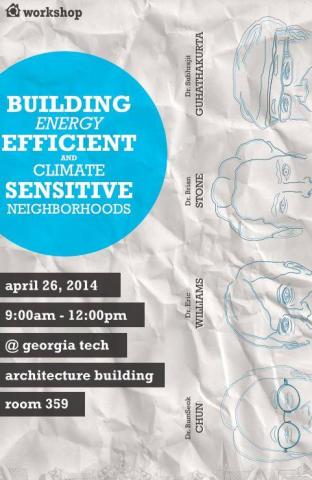event
Building Energy Efficient and Climate Sensitive Neighborhoods Workshop
Primary tabs
Instructors:
Dr. Subhrajit Guhathakurta, City and Regional Planning, Georgia Tech
Dr. Brian Stone, City and Regional Planning, Georgia Tech (To be confirmed)
Dr. Eric Williams, Golisano Institute for Sustainability, Rochester Institute of Technology
Dr. BumSeok Chun, Center for GIS, Georgia Institute of Technology
The extreme weather events that have devastated many communities in the U.S. have raised general awareness about the potential impacts of a changing climate. As a result, there is now a growing demand for building energy efficient and climate sensitive neighborhoods and communities. The state of California has been the standard bearer of legislation to advance such communities through Assembly Bill 32 (California Global Warming Solutions Act) and Senate Bill 375 (Sustainable Communities Act). The large and growing membership of ICLEI (a network of local governments for sustainability) suggest that many other local governments in the U.S. are pushing ahead with their own agendas for sustainable and climate sensitive communities. These communities are eager to find answers to questions such as: 1) How can we evaluate the energy demands of particular types of neighborhoods? 2) What are the ways for retrofitting neighborhoods and cities to be energy efficient; 3) How can we build cooler urban environments; and 4) What kind of policies and regulations would be necessary to make cities sustainable? This workshop is designed to answer these and other related questions.
The workshop is specifically meant to help planning professionals and other urban leaders engaged in urban policy-making. We will discuss the state-of-art in evaluating neighborhoods in terms of their climate impacts and provide tools and templates that can be applied in practice. We will also discuss various policy options and how they are applied (or could be applied) in practice. Topics will include:
-Urban heat island effects of different urban environments
-Mitigation strategies for addressing excessive heat
-Life-cycle analysis for determining embedded energy of buildings and neighborhoods
-Transportation energy demands of different neighborhoods
-Policy choices and implementation strategies
Registration Fee: $25
Register at https://epay.gatech.edu/C20793_ustores/web/store_main.jsp?STOREID=255&SINGLESTORE=true
Groups
Status
- Workflow status: Published
- Created by: Kyle James
- Created: 03/26/2014
- Modified By: Fletcher Moore
- Modified: 04/13/2017
Categories
Target Audience

